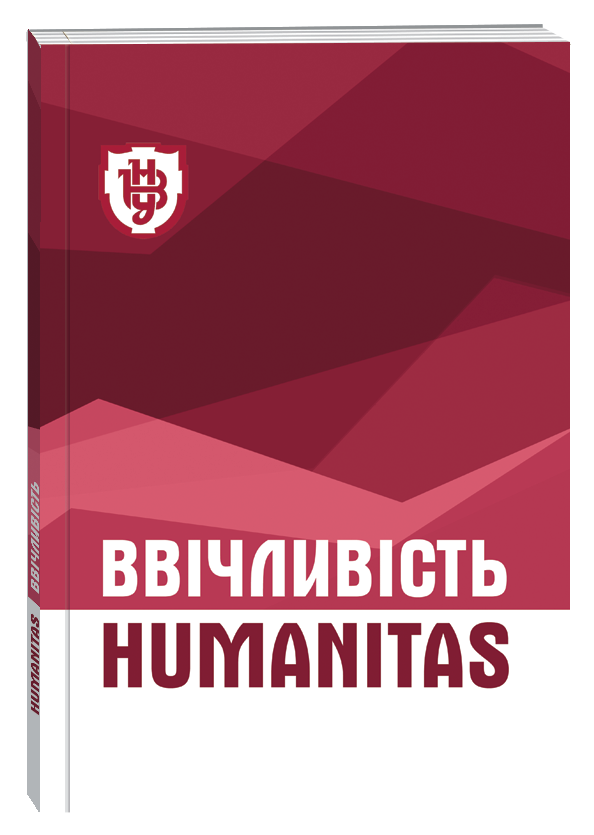FEATURES OF ETHNIC TOLERANCE OF UKRAINIAN REFUGEES IN EUROPE IN THE CONDITIONS OF THE WAR IN UKRAINE
DOI:
https://doi.org/10.32782/humanitas/2025.3.25Keywords:
war, refugees, adaptation, integration, tolerance, ethnic tolerance, ethnic identityAbstract
The article examines the features of ethnic tolerance of Ukrainian refugees in the countries of the European Union in the context of the Russian-Ukrainian war. It is proven that an urgent and significant problem of Ukrainian refugees abroad is adaptation and integration into a new socio-cultural environment, which depends on the adoption of values, norms and models of behavior in the host European communities, and the condition that ensures this process is the level of ethnic tolerance. The problem of the impact of negative psychosocial and psycho-emotional consequences of the war in Ukraine on the increase in forcibly displaced persons is reflected in the works of domestic and foreign researchers, but in the scientific space there are not enough works devoted to the study of ethnic tolerance of Ukrainians who were forced to leave abroad in connection with the full-scale russian aggression that has begun. It is determined that ethnic tolerance is considered: as a property and trait of the personality; a form of tolerance to the customs, lifestyle and traditions of representatives of other cultures and ethnic groups; as a prerequisite for interpersonal interaction in different ethnic groups of society; how tolerant is the attitude of representatives of one ethnic community towards representatives of another community. The results of the empirical study revealed: the current problems of Ukrainian refugees in Europe are financial and language problems, employment and housing search, problems of adaptation to the new social environment; indicators of various types of tolerance have an average level of severity, and a third of those surveyed revealed a high level of ethnic tolerance; most refugees revealed a positive ethnic identity, although there is a slight increase in such types as indifference and ethno-egoism as opposing trends; the highest indicators of negative (inverse) correlation were found for tolerance indicators and indicators of «ethno-nihilism» and «ethno-isolation».
References
Брюховецька О.В. Психологічні особливості формування етнічної толерантності персоналу освітніх організацій. Вісник післядипломної освіти. 2020. Вип. 20(49). С. 10–24. URL: https://ojs.uem.edu.ua/index.php/spn/article/view/469 (дата звернення: 01.05.2025).
Будякова О., Слободенюк К. Соціально-економічні чинники впливу на міграційні процеси в україні в умовах воєнного стану. Вчені записки Університету «КРОК». 2025. №1 (77). С. 96–106. DOI: https://doi.org/10.31732/2663-2209-2025-77-96-106 (дата звернення: 01.05.2025).
ВГО «Опора». 2023. Кількість українців та їх міграція за кордон через війну – дослідження Громадянської мережі ОПОРА. Офіційний веб-сайт. URL: https://www.oporaua.org/viyna/kilkist-ukrayintsiv-ta-yikh-migratsi- ia-za-kordon-cherez-viinu-doslidzhennia-gromadianskoyimerezhi-opora-24791. (дата звернення: 01.05.2025).
ГО «Інститут молоді». 2022. Опитування українських біженців та осіб, які шукають тимчасовий прихисток за кордоном. URL: https://inmol.org/zhyttia-ukraintsiv-zakordonom-vnaslidok-povnomasshtabnoho-vtorhnen-nia-rf-na-terytoriiu-ukrainy/.(дата звернення: 01.05.2025).
Декларація принципів толерантності: затверджена резолюцією 5.61 Генеральної конференції ЮНЕСКО від 16 листопада 1995 р. URL: https://ips.ligazakon.net/document/MU95324 (дата звернення: 01.05.2025).
Етнопсихологія : психодіагностичний практикум. хрестоматія: навч. посіб. / А.М. Османова, Л.М. Співак. К.: Університет «Україна», 2023. 128 с. URL: https://deps.snu.edu.ua/media/filer_public/43/05/43059fd4-c9f5-4bf2-8131-52201104a58c/osmanova_aetnopsikhologiia_navchalnii_posibnik_praktikum_khrestomatiia.pdf (дата звернення: 01.05.2025).
Євтух В.Б., Трощинський В.П., Аза Л.О. Міжетнічна інтеграція: постановка проблеми в українському контексті : навчальний посібник. К. : ВПЦ „Київський університет”, 2003. 58 с. URL: https://sociology.knu.ua/uk/library/mizhetnichna-integraciya-postanovka-problemi-v-ukrayinskomu-konteksti-navchalniy-posibnik (дата звернення: 01.05.2025).
Левус Н.І. Особистість етнічно толерантної людини: яка вона? Проблеми сучасної психології. Збірник наукових праць К-ПНУ імені Івана Огієнка, Інституту психології імені Г.С.Костюка НАПН України. 2013. Вип. 22. URL: http://eehb.dspu.edu.ua/index.php/2227-6246/issue/view/9701 (дата звернення: 01.05.2025).
Міграція та соціально-політичні настрої під час повномасштабної війни Росії проти України – восьма хвиля дослідження. Аналітичний звіт. Gradus Research Plus. Серпень 2022. С. 8, 27. URL: https://gradus.app/uk/open-reports (дата звернення: 01.05.2025).
Настрої та оцінки українських біженців (липень – серпень 2022 p.). Разумков Центр. 2022. 30 серп. URL: https://razumkov.org.ua/napriamky/sotsiologichni-doslidzhennia/nastroita-otsinky-ukrainskykh-bizhentsiv-lypen-ser-pen-2022p. (дата звернення: 01.05.2025).
Риндзак О.Т. Соціокультурні аспекти інтеграції внутрішньо переміщених осіб у регіональному вимірі. Регіональна економіка. 2016. №3. С. 120–127. URL: https://re.gov.ua/re201603/re201603_120_RyndzakOT.pdf (дата звернення: 01.05.2025).
Семенів Н.М. Дослідження етнічної толерантності в студентському середовищі. Молодий вчений. 2019. №3 (67). С. 275–280. URL: https://molodyivchenyi.ua/index.php/journal/article/view/2834 (дата звернення: 01.05.2025).
Федоренко О. Теоретична модель соціальної інтеграції внутрішньо переміщених осіб у громаду. Вісник Київського національного університету імені Тараса Шевченка. Соціальна робота. 2018. №1(3). С. 17–22. URL: https://visnyk.soch.robota.knu.ua/index.php/journal/article/view/30 (дата звернення: 01.05.2025).
Фурик Б.Б. Міграція як ефект агресії росії проти україни: розуміння наслідків. Науковий вісник Ужгородського Національного Університету. 2024. Серія ПРАВО. Випуск 83: частина 2. С. 358–364. URL: https://visnyk-juris-uzhnu.com/wp-content/uploads/2024/07/55-1.pdf (дата звернення: 01.05.2025).
Масенко В. 85% українських переселенців відзначають, що в новій місцевості до них ставляться доброзичливо. Village. Україна. 2022. 17 чер. URL: https://www.village.com.ua/village/city/city-news/327125-85-ukrayinskih-pereselentsiv-vidznachayut-scho-v-noviy-mistsevosti-do-nih-stavlyatsya-dobrozichlivo (дата звернення: 01.05.2025).
Cedos. (2022). Вимушена міграція і війна в Україні (24 березня – 10 червня 2022). URL: https://cedos.org.ua/researches/vymushena-migracziya-i-vijna-v-ukrayini-24-bereznya-10-chervnya-2022/(дата звернення: 01.05.2025).
Gullahorn J. An Extension of the U-Curve Hypothesis. Journal of Social Issues, 1963. 19 (3). Р. 33–47. URL: https://doi.org/10.1111/j.1540-4560.1963.tb00447.x (дата звернення: 01.05.2025).








